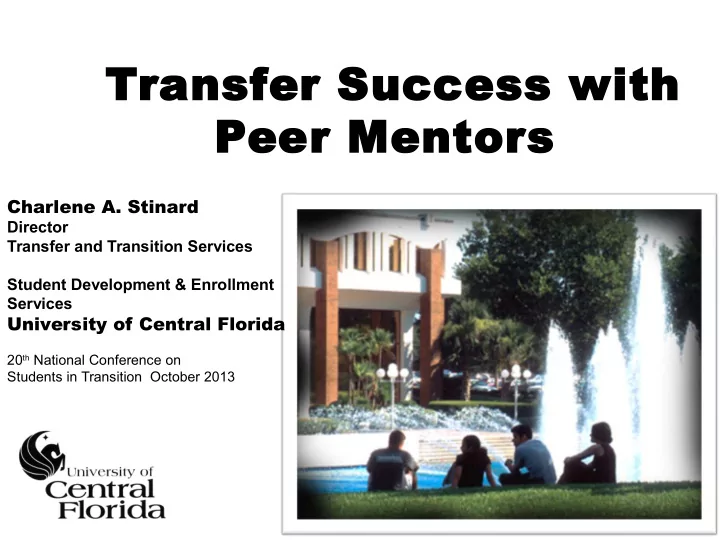

Transfer Success with Peer Mentors Charlene A. Stinard Director Transfer and Transition Services Student Development & Enrollment Services University of Central Florida 20 th National Conference on Students in Transition October 2013
Overview Purpose • UCF model • Establishing purpose, aligning with division and university goals Common goals • Assist transfer students • Insure smooth transitjon and progress to graduatjon • Improve retentjon
Overview (contjnued) Costs and funding • Budget • Paid or unpaid, academic credit • Partnerships: creatjve funding Planning • Long-/short-range purposes - 3-year strategic plan • Intentjonal, focused outcomes - Annual department/program assessments
Large Public University Large Public University 2nd largest US university 2013-14 enrollment = 60,000 + Transfer enrollment 2012-13 • 11,014 new transfer students enrolled (annual) • 6,700 new freshmen enrolled (annual) Partnership instjtutjons – 4 primary feeder schools
UCF Model Transfer and • Transition Services • Vision
UCF Model Transfer and Transitj tjon Services 3 Functj tjonal Areas Preparatj tjon • Advise students before they transfer Transitj tjon • Work with transfers during their fjrst semester Progression • Provide a solid foundatjon for retentjon and graduatjon
Serving Transfer Students 2012-13 academic year: UCF enrollment 59,800 + • TTS assisted more than 40,000 constjtuents in person, by phone, by e-mail • TTS stafg and Peer Mentors: 24,000 + student advising contacts Award winning website htup://transfer.sdes.ucf.edu • 180,000 + website hits annually • Student web developer Partjcipated in 20 transfer orientatjons
Program Goals Create new roles for students in student learning (division strategic goal) Expand opportunitjes for experience-based learning (division strategic goal) Provide quality services for increasing numbers of students (university goal) Assist transfer students in connectjng to the campus community Inculcate the values of the instjtutjon
TTS Org Chart
Resources University commitment of critjcal resources: space, funding To pay or not to pay Partnering Organizatjonal structure Assessment and improvement
Transfer Shock Survivors … a temporary dip in GPA during the first or second semester at the new institution… John Hills, University of Georgia, 1965
TTS Peer Mentor Program A successful model for • Preparing students academically for transfer • Assuring a smooth transfer transitjon • Connectjng to the campus community • Providing support for progress to graduatjon Supports student leadership development Provides important professional development Helps to manage heavy advising loads Promotes retentjon
Ingredients for Peer Program Success Recruitment and selectjon Training Supervision Commitued students University support
Recruitj tjng Peers Recommendatjons from community college advisors E-mails to currently enrolled transfers Announcements at orientatjons Consider your instjtutjon’s transfer student demographics Annual process
Variety is the spice… Refmect your student body Internatjonal students, students with disabilitjes Difgerent majors Transfers from public, private, 2-year and 4- year Transfers from your feeder schools
Interviews Selectjng a search commituee Individual interviews: presentjng yourself well Group interviews: elements of team work Interview with current Peer Mentors Valuing student perceptjons
Training Philosophy Artjculatjng instjtutjonal values • Inculcatjng the CREED • A commitment to shared values Peer Mentors: UCF Creed Advocatjng tolerance • Diversity initjatjves Encouraging engagement • Building a sense of community, responsibility “… provide a more positjve ethical framework for college student conduct … and encourage …actjve student affjrmatjon and commitment to campus moral norms.”
Training Basics Aligned with SDES Strategic Goals Creatjng responsible employees, citjzens of the campus community Providing learning-based experience Relatjng students’ choices and exploratjon of their values to who they are, who they want to be Exploring what they stand for, what they value Learning from each other
Training Initjal 6 week training program Online learning modules, weekly professional development meetjngs Offjce practjces, procedures; university policies Academic informatjon Campus resources
Benefj fjts of Training Confjdent, resourceful Peers Accurate informatjon Antjdote to • “My friend says…”
Peer Mentor Roles Preparatj tjon Pre-admission academic advising • Appointments, e-mails, phone calls • General educatjon program, common program prerequisites Outreach programs: workshops, panels, surveys, focus groups Students helping students
Orientatj tjon Transitj tjon 20 transfer orientatjons, 550 to 750 transfers atuend each session Transfer Success Program – describing The UCF Experience • What to expect, what is expected • Introducing the CREED and campus resources Welcome events: promote engagement
Retentj tjon Progress to graduatj tjon Are You on the Knight Track? transfer seminar – Peer Mentor panel discuss their experiences Transfer Success Workshop series – planned and executed by Peer Mentors Campus clubs and organizatjons – introducing transfer to the campus community
Engagement: Transfer Knights
Scholarship Tau Sigma Natjonal Honor Society 3.5 GPA in fjrst full-tjme semester
Peers as Advocates Peers Mentors • Knowledgeable, confjdent, resourceful, professional • Connected to the campus Students listen to students • Importance of the transfer student “voice” on campus
Assessment Meetjng division goals • Measuring Student Learning Outcomes Measuring what the Peers learn • Advising rubric • Videos • Performance evaluatjons Evaluatjng the program
Program Assessment Annual Instjtutjonal Efgectjve Plans • Alignment with division and university goals Measuring the efgectjveness of Peer presentatjons, programs, workshops Measuring student learning • Pre-/post-tests • Survey responses • Focus groups
Planning Guide • Needs assessment: What do you want/need in a peer mentor program? • Consideratjons: instjtutjonal context, level of support, resources • Likely partners • Peer mentors’ roles • Assessing your program and performance
QUESTIONS AND COMMENTS
Contact Informatj tjon Contact Informatj tjon Charlene A. Stj tjnard, Director Transfer and Transitj tjon Services Charlene.Stjnard@ucf.edu 407.823.2231 Student Development and Enrollment Services University of Central Florida
Recommend
More recommend